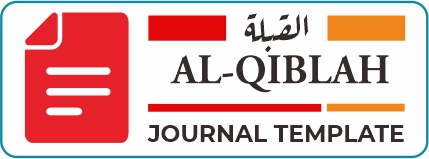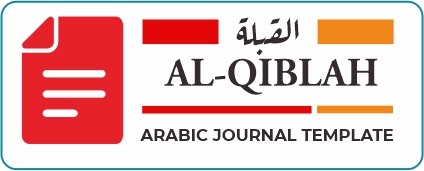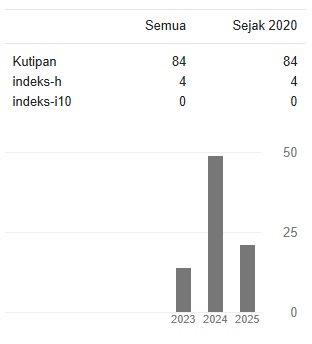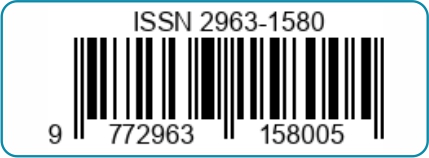Peran Al-Qur’an (Pengaruh Al-Qur’an dalam Membentuk Bahasa Arab dan Sastra)
The Role of the Qur'an (The Influence of the Qur'an in Forming Arabic Language and Literature)
DOI:
https://doi.org/10.36701/qiblah.v3i1.1334Keywords:
Qur’an, Arabic, language, literatureAbstract
This research aims to determine the role of the Al-Qur'an and its influence in shaping Arabic language and literature. The Al-Qur'an has very high miracles, both at the level of content and the language it uses. The height of the language of the Qur'an can be seen in the aspects of phoneme selection, word selection, sentence selection and the effects they cause. This research uses qualitative research which focuses more on aspects of in-depth understanding, using library research methods. The research results found that: The influence of the Al-Qur'an in shaping Arabic language and literature is very large and profound. The language of the Koran is considered the pinnacle of beauty and excellence in the structure of the Arabic language and has made a significant contribution to the development of Arabic literature. The strength and beauty of the language of the Koran has become an inspiration and model for Arabic speakers in developing literary skills and their language, such as the beauty of the language, use of vocabulary and terms, rhetorical style, influence on Arabic poetry, as well as the role of the Al-Qur'an in providing inspiration and guidance for Arab writers and poets in creating literary works.
Downloads
References
Darwisy, Mahmud. “Atsaru al-Qur’an al-Karim fi al-Adab al-Arabi.” Akli Mohand Oulhadj-Bouira Tubirett, 2017.
Kementerian Agama Republik Indonesia, Terjemahan Al-Qur’an. Jakarta Pusat, 2019.
Khaldun, Ibn. Tarikh Ibnu Khaldûn, Kitâb al-‘Ibar Wa Dîwân al-Mubtada’ Wa al-Khabar Fî Ayyâm al-‘Arab Wa al-‘Ajam Wa al-Barbar, Wa Man ‘Âṡarahum Min Zawî al-Sulṭân al-Akbar. Vol. Jilid II. Beirut: Dâr al-Kutub al-‘Ilmiyyah, 1992.
Lasyin, Abdu al-Fattah. Ibnu Qayyim Wa Hissuhu Al-Balaghi Fi Tafsir al-Qur’an. Lebanon: Dar al-Ra’id al-Arabi, 1982.
Manẓûr, Ibn. Lisân Al-Arab. XVIII. Beirut: Dâr al-Kutub al-‘Ilmiyyah, 2009.
Muhammad, Azhar. “Beberapa Aspek Keunikan Dan Keistimewaan Bahasa Arab Sebagai Bahasa Al-Qur’an,” June 2005, 61–76.
Muhammad Naja, Ibrahim. Fiqh Al-Lughah al-Arabiyah. Kairo, n.d.
Osman, Rahmah Ahmad H., and Muhammad Ikram Abu Hassan. “Keistimewaan Bahasa Arab Sebagai Bahasa Al-Quran Dan Kepentingan Menguasainya Bagi Para Mufassirīn: The Privilege of Arabic as the Language of the Qur’an and the Importance of Mastering It for the Mufassirīn.” AL-HIKMAH: INTERNATIONAL JOURNAL OF ISLAMIC STUDIES AND HUMAN SCIENCES 5, no. 2 (May 30, 2022): 325–42. https://doi.org/10.46722/hikmah.v5i2.260.
Qattan, Manna’ al-. Mabahis Fi ’Ulum al-Qur’an. Mansyurat al-’Ashr al-Hadis, 1973.
Rahmatullah, Lutfi. “Pengaruh Keindahan Bahasa Al-Qur`an Terhadap Perkembangan Sastra Dalam Dunia Islam.” Qaf: Jurnal Ilmu Al-Qur’an Dan Tafsir 2, no. 1 (January 1, 2017): 119–40.
Ridwan, Mohammad. “Membuka Wawasan Keislaman: Kebermaknaan Bahasa Arab Dalam Pemahaman Islam” Vol. 4 No. (2), (2023).
Siyoto, Sandu. Dasar Metodologi Penelitian. Cetakan I. Yogyakarta: Literasi Media Publishing, 2015.
Syamlul, Muhammad. I’jaz Rasm al-Qur’an Wa I’Jaz al-Tilawah. Kairo: Dar al-Salam, 2010.
Versteegh, C. H. M. Arabic Grammar and Qur’anic Exegesis in Early Islam. Leiden: E.J. Brill, 1993.
Zaidan, Jurji. Târîkh Adâb Al-Lugah al- ’Arabiyyah. Vol. Jilid I. Beirut: Dâr al-Fikr, 1996.



 FOCUS AND SCOPE
FOCUS AND SCOPE EDITORIAL TEAM
EDITORIAL TEAM












